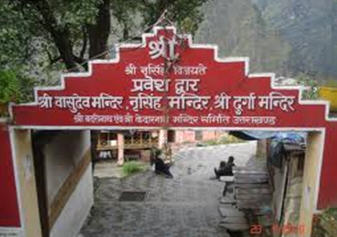The name joshimath or jyotirmath means "monastery of light." When Badrinath closes during the winter, the priests From the Badrinath Temple come to Joshimath and continue their puja worship at the Narasimha Temple. The utsava-murti of Badri Vishal is brought to Pandukeswar for worship. There is also the ancient Vasudeva Temple, which is dedicated to Lord Krishna.
One of the four main Sankaracharya maths is located here. It is said that Adi Sankaracharya meditated in a cave here under the Kalpavriksa tree (Shahtoot/Mulberry).
In the lower part of the town is the Gauri Shankar Siva and Nava Durga temples.
Tapovan, 11km north of Joshimath along the Curzon Trail, is known for its hot springs.
Practicalities
Joshimath is between Rishikesh (11 hr) and Badrinath (21/2 hr, 44km). There is a good chance that you will have to stop here for the night on the way to Badrinath.
Narasimhadeva Temple

In this temple is a Deity of Lord Narasimha, which is self-manifested from a shaligram-shila. He is about 25cm (10 in) high and remarkably detailed, sitting in a lotus position. To the right of Lord Narasimha are Sita, Rama, Hanuman, and Garuda. Against the left wall is a deity of Chandika, which is another name for Kali.
On the altar to the right of Lord Narasimha are deities of Kubera, Uddhava, and Badri Vishal. There is an altar for Lakshmi Devi just outside the door of the temple.
Sankaracharya is said to have installed this Narasimha Shaligram. The left wrist of Narasimha is incredibly thin and gets thinner every day. It is said that when Kali yuga overtakes the world, the wrist (arm) will break and the mountains Jaya and Vijaya (near Vishnu Prayag) will collapse and block the present road to Badrinath. The new Badrinath will be relocated at Bhavisya Badri, about 23km southeast of Joshimath.
If you want to get a good view of ,Lord Narasimhadeva's wrist you can come when he is bathed between 7.30 and 8.30 am in the morning.
This temple is said to be over 1,200 years old. It is open from 5 am to 8.30 pm. This temple and the Vasudeva Temple, just 10m away, are located in the bottom part of the town, about a three minute walk from the Kedar.
b) Vasudeva Temple
This temple is one of the 108 Divya Desams, recognized by the Tamil Nadu Vaishnava saints as being very important Vishnu temples. .The black carved stone Deity of Lord Vasudeva is about 2m (6 ft) tall. He stands with his associates Sri, Bhu, Nila, and Kama. This temple is about 30 m from the Narasimhadeva Temple. To the left of the main entrance is a deity of dancing Ganesh, which is said to be one of only two such deities in India. This temple is very ancient, and no one knows exactly how old it is.
c) Sankaracharya Math
This temple is located on the ridge above the upper part of the town. If you enter the temple and follow the signs to your left, you come to the cave where Sankaracharya is said to have meditated. This is where he got his realizations to write and defeat Buddhism and reestablish Vedic authority.
If you go up the steps to the right of the temple entrance (before entering the temple complex), you come to the Kalpavriksa tree, where Sankaracharya is said to have attained self-realization. This 38m (125 ft) tall tree has a huge trunk and is said to be more than 2,400 years old. This is so big that the hollows in the trunk are large enough that a person could stay in them.
Sankaracharya wrote the Sankara Bhasya in Joshimath.
